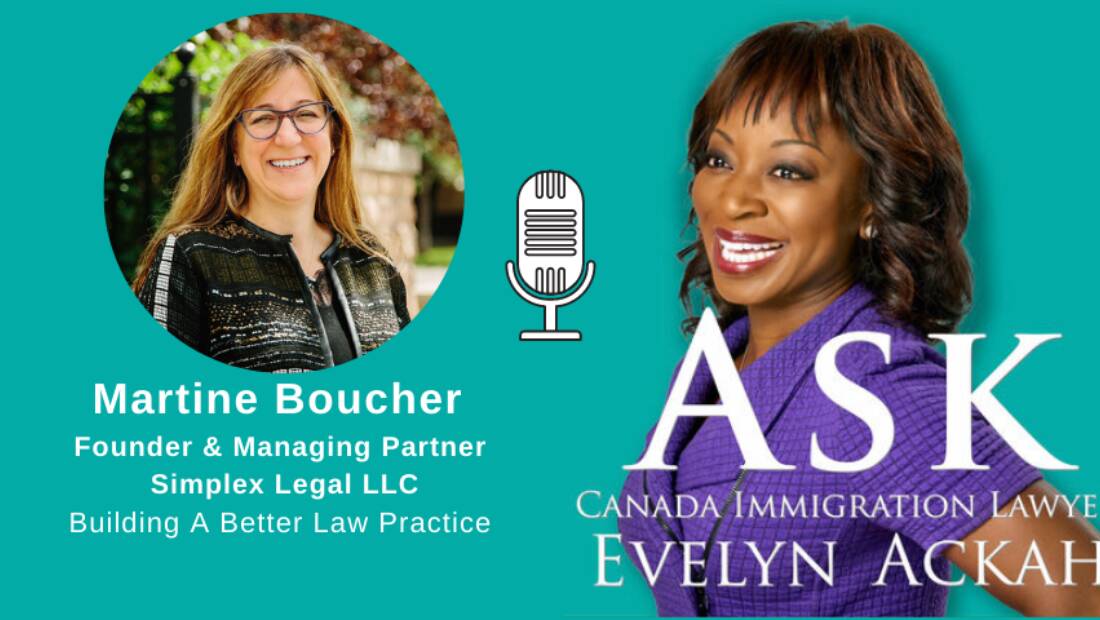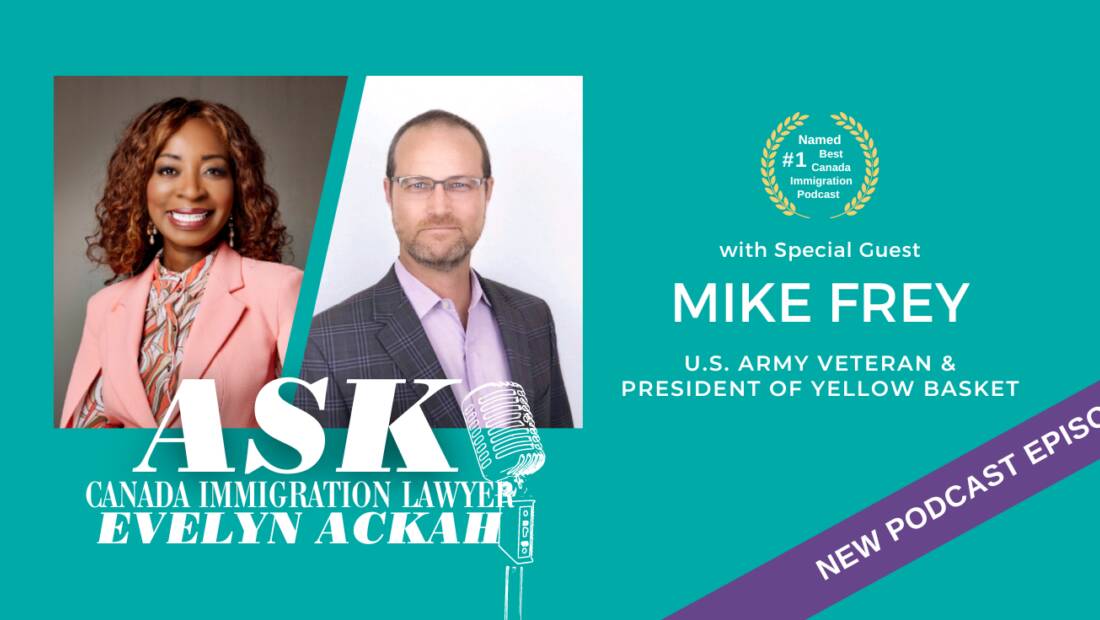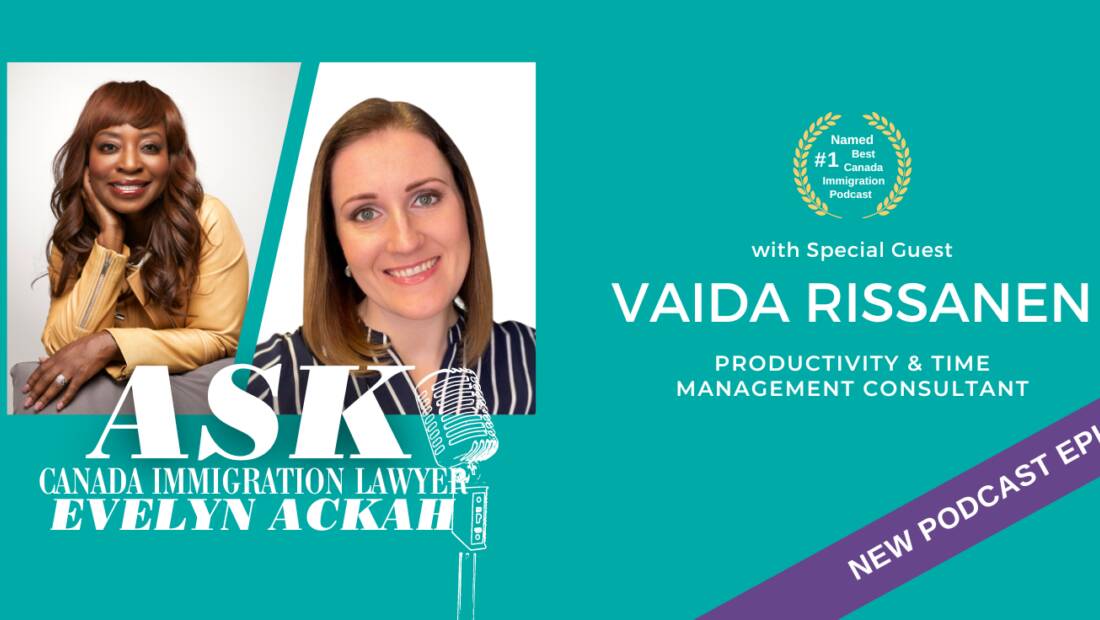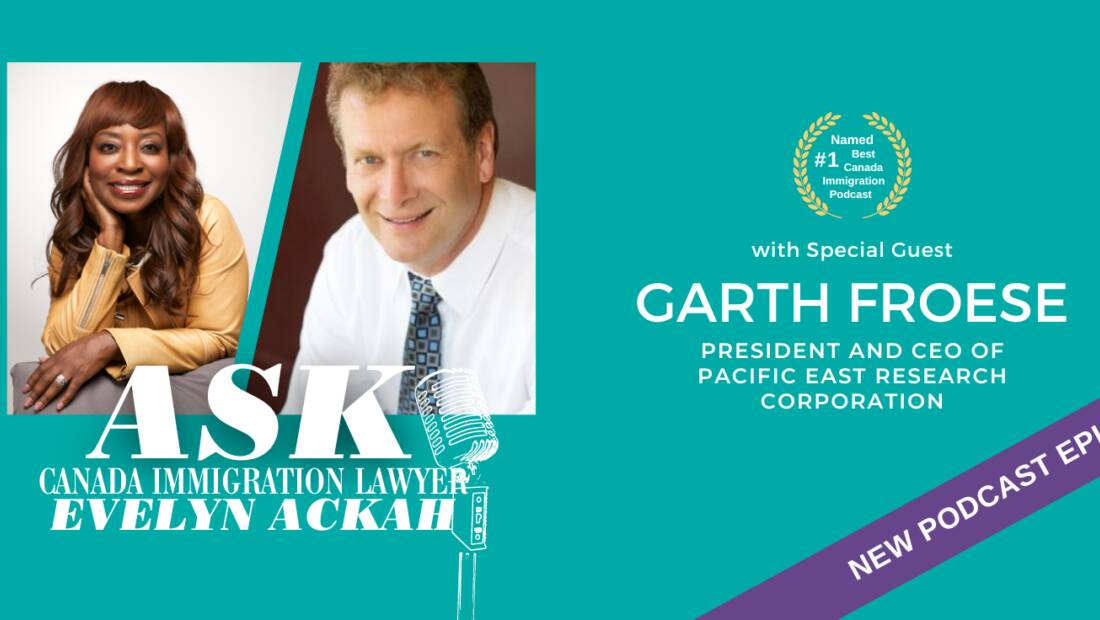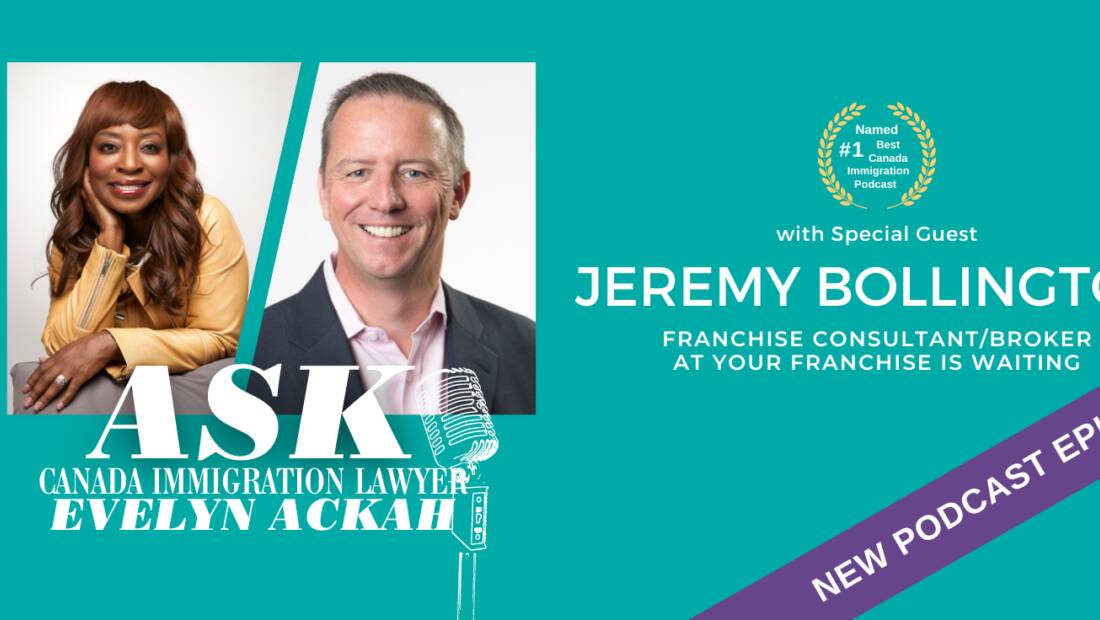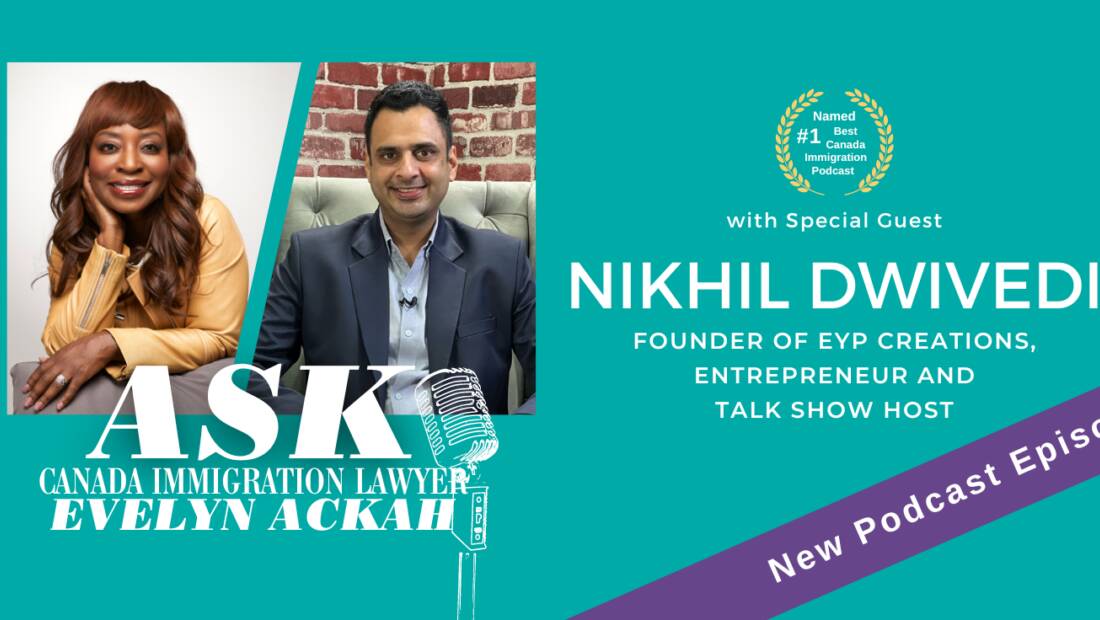Or listen on your favourite podcast app
Immigration lawyer Evelyn Ackah talks to Martine Boucher, Founder & Managing Partner of Simplex Legal. Simplex Legal LLC was founded in 2011 to help businesses surpass themselves and overcome legal challenges in the most cost-effective way. Martine and her co-founders started with a simple plan: To build a better law practice - professional without pretension, offering value without compromising skill, and proposing simplicity without sacrificing quality.
Martine and Evelyn discussed:
- Why Martine launched a virtual in-house counsel law firm
- Simplex Legal's secret recipe for success
- How the pandemic impacted their firm and their clients
- Simplex Legal's fees and services
- Learning to be a business leader and entrepreneur
- Inspector Gamache's path to wisdom
- Becoming a team player
- Why businesses choose Simplex Legal: what type of client is the best fit for Simplex
- Moving to Calgary and practicing law as a Francophone, and needing to learn English
- Mentoring women in law
- How the legal industry is changing in a big way
- What unique qualities does Martine bring to the table?
About Evelyn Ackah
Evelyn Ackah is the Founder and Managing Lawyer at Ackah Business Immigration Law. We work with individuals and business owners from all over the world. For more information on immigration to Canada or the United States, Ask Evelyn Ackah at Ackah Business Immigration today at (403) 452‑9515 or email us directly at contact@ackahlaw.com.

Transcript
Evelyn Ackah:
Good day. This is Evelyn Ackah from Ackah Business Immigration Law and Ask Canada Immigration Lawyer podcast. I have the pleasure today of introducing and welcoming my dear friend and business colleague, Martine Boucher, who is the co-founder and managing partner of Simplex Legal. And they are a virtual law firm all across Canada, focused on providing corporate, employment and other legal services to clients across Canada. Welcome Martine, how are you?
Martine Boucher:
Well, I'm doing great, Evelyn. It is so nice to be here with you today. So happy that you've invited me.
Evelyn Ackah:
Well, my goodness. I know how busy you and I really appreciate that you made time. I've obviously been following your career since we became friends and colleagues. And I just thought you had a wonderful story to share about Simplex Legal. So before we get into your journey, tell me why you started Simplex Legal in 2011? Just around the time I started my firm.
Martine Boucher:
Yeah, no. At the time where nobody knew how to spell Zoom. We were already thinking of it. It all weaves into my personal story. So I worked for a big law firm for a period of time. Then I went in-house, right. And after my time, as in-house at GE Capital, I was kind of pausing and thinking like, so what's next for me? Where do I want to go? What's exciting? And I met at the time my business partner, he then became also my personal partner. So, but we were discussing some needs in the marketplace and just saw where there were people like me who wanted more flexibility in their lives that were talented lawyers, but looking for a home.
Martine Boucher:
A place they would belong and they could offer really quality services, but on their own terms. And that was the germ of the idea combined with Geoff saying we need in-house counsel, everybody should have a great in-house counsel to work with them. Because that's invaluable when you get the right support and businesses were struggling in getting that practical advice, but on flexible terms. So we married the two and that was the idea of Simplex.
Evelyn Ackah:
You married the two and then you got married. One or the other happened first. So tell me what makes Simplex Legal different from another law firm or national law firm. How many people do you have currently?
Martine Boucher:
We are at the 25 sectionals right now, mark plus everybody supporting this journey. So we've about 35 people working with us on different terms. Some people are full-time, some people are part-time flexible schedules. So it's grown quite a bit since the early days where me and my friend Erica started on my kitchen table doing a few files here and there. And the idea was on a napkin. It's kind of cool to see that, but where we're different, that's such a great question. I think it reflects back on our values and what we really believe in and how we lift that on the every day. I'd say we're very collaborative, which is a key aspect to me that the team performs as a team, that we would be able to support each other. It's not a mercenary culture.
Martine Boucher:
So we are collaborative amongst ourselves, with our clients. That makes a huge difference. We're fun. We like to have fun and just enjoy life. So there's a great work-life balance that is thrown in the mix, anti-stodgy. We really believe that you can deliver excellent services, even though you're not in a big tower downtown. And I bet that great ideas come from anywhere. And I think the pandemic has reinforced that messaging in a very strong way. And then we just have amazing people working with us. So that's who we are. And then we deliver our services really by, we're leveraging technology in such a big way. We live in the world of abundance of everything. We've got technology, we've got processes. So we're super-efficient in the way we do it. That's the secret recipe right there.
Evelyn Ackah:
It sounds like the secret recipe for success. That's so exciting. One of the questions I had for you is around your practice areas. Can you give me an overview because I don't think I did it justice. You're not just business lawyers. What kind of practice areas do you provide support to corporations and clients and individuals?
Martine Boucher:
We do everything from the boring operational support, starting with supply agreements that every business needs to run their business, all the way to more savvy financing agreements, regulatory compliance, helping with a client's ESG program. We really do a full range of business services. So I'd say the line we draw is litigation, we're not litigators. We're really like a true solicitor and in every sense of the term, and whenever a file is ready for litigation, then we help our client. We will have to manage, organize a file and pass it over to people that are doing it best. In a similar fashion, I think sometimes there are some expertises out there that a few people have in Canada. And that's probably part of what our clients really love about us, is we will raise our hand as much as we're low overhead.
Martine Boucher:
We offer great fees and creative arrangements. There are times where you just need the expert and that's where I met you. There are times where it's just the right thing to do. And instead of learning it ourselves, like you just go and see the people that do this and know it inside out and know that people to call in and so on. So we're not afraid of just sometimes telling your clients that we could learn this, but it would be more efficient to just seek out the best expertise that there is to support you in that part of the journey.
Evelyn Ackah:
I appreciate that. We've definitely had opportunities to get referrals from your team. And if we can help, great. But it's very much, I think being able to for you and your team to focus on what you do best, is what we do to you here at Ackah Law exactly the same. One of the things I think has been interesting about your journey is lawyer, big firm, in-house big company, Simplex. How have you had to learn to be a business leader and entrepreneur? Because that's not what they teach us in law school. And as you know, even me of 10 years, on every day is different. I'm learning every day, I'm trying to improve. It's not easy. How did you become an entrepreneur? And what do you think it takes to be successful? I need the magic here.
Martine Boucher:
What a great question. You and I sometimes share a glass of wine and discuss this topic in more depth, but I think it takes a lot of courage and naivety combined in a nice packaging. We often joke and say that if anybody would have told me how much effort and dedication would have to be overcome and just packaged to make Simplex happen, I would have laughed. And I would have been like, "Okay, see you another day." But it's not how it happens. You don't become a business person overnight. I think it's a lifetime progress that you make, you start small. And I'm a super big fan of Louise Penny. That's probably something we've not talked about, but the author, Louise Penny and her main character Inspector Gamache, that I just fell in love with a fictional character.
Martine Boucher:
In the books, Inspector Gamache often talks about the path to wisdom is being able to say those four things, I don't know, I need help, I'm sorry, and I was wrong. And that's really stayed with me all the way through. I've thought about it, being a business person as it has made me fumble in so many ways. You can have amazing successes and then the following day, you stumble on obstacles that you wonder how you're going to overcome that obstacle. And then you just go at it and I'd say the best thing that I've ever done is not doing it alone. I have my partner in life, Geoff who's a business guy. I reached out, I have our group of women in law firms that I rely on. I'm part of strategic coach.
Martine Boucher:
I've got a different number of communities that I can tap in and discuss the struggles, celebrate successes, and that's made it. And just getting a super amazing team to work with me like this first understanding you cannot do it alone. And that's so foreign to lawyers, like we're so trained to be individual contributors. I don't care what they say about the university experience. It's a lot about get into your office, sit down through this work, deliver, move on. Being in business is totally the opposite. You will never succeed alone, you can't succeed alone. So you need to become a team player, if you are not already and you need to, well choose your tribe, listen, listen, listen and listen some more. And don't forget to have some fun. I think that would be my thinking over the last couple of years.
Evelyn Ackah:
Oh, I think it's so great you talk about different communities. Obviously like you, 10 years on 11 years on, it's become about finding all those communities for support because there's one thing about being a leader of a business, as you know, is it's quite lonely. And even though you've got Geoff, who's your business partner and life partner. I also feel like it's just a lonely experience, and you can't talk about everything with everybody.
Evelyn Ackah:
And I think it's finding those places where you can discuss, I have my tech group, have my how to manage a small law firm group. I've got lots of other supports. I've got our group with the women that we meet and just talk about life and practice, and look for tips on how to improve. I think the biggest thing I've learned is this is constant learning, constant learning and looking for resources to support yourself because it is not a quick sprint. It is a long marathon, you know what I mean? And it is an up and down thing. How has Martine, how has COVID affected your business? Have you grown or have you shrunk? I'm so interested to see how everybody is moved through it. Because you were already virtual to begin with.
Martine Boucher:
Yeah. We were virtual by design, so fairly to a lot of people who had to learn how to become digital and virtual. We were up and running. We were made for this it's it feels strange at times to say it because I know a lot of people have struggled. Personally business-wise and so on, but for Simplex it has accelerated our growth, but I don't know how many years. I'm very curious to see down the road, looking back how much, how much growth we've had because of COVID. This has been the biggest legitimization of our business model. And two years ago, I still had potential clients saying, "Well, is there anything wrong with your lawyers? Why would anybody want to work part-time remotely?" People were really challenging the assumptions we had made and I'm like, we're attracting amazing talent.
Martine Boucher:
There are people out there who would need or want something different, but trying to convince when you're at the beginning of a wave, it's really hard. It's amazing that question doesn't come out very often since COVID, "Can you work from home? Can your lawyer really support us at the stance like this?" This is all this is behind us so we can really get into business. So it's been really good on that front. On the other end, our team members who were all set up to work from home, we're not necessarily set up to have the little ones running around and having to focus them in front of a screen. Because they have to do studies from home or, taking care of ageing parents and suddenly not having any more home care. There's a host of personal issues that have popped to the surface that were real and could really bring some struggles to the team.
Martine Boucher:
But we raised up as a team. Everybody was there for each other and I think we did quite well. Where worries for the likes of you and me, I don't know if you think about that from time to time. I've been reading a number of articles saying, there are people that will feel the effect after COVID.
Evelyn Ackah:
After. Yeah.
Martine Boucher:
We've been running on adrenaline and I think business people, the business leaders in our communities, we are part of that. We did not share a lot about our struggles. We were there first to support our clients, our team, making sure money keeps coming in so that you can make payroll, all of these things that are very real when you're in business. I wonder how many of us will have a dip in a few months.
Evelyn Ackah:
Yeah, I think you're right. I think already we're all getting into our second shots, our vaccinations in the end. And I just know for me, I'm tired. It's been a long 18 months, and every day is just a grind right now. And the joy of it is helping the clients, but it definitely takes a toll. And as you know, we keep encouraging each other to meditate and exercise and drink water and all those good things. But I think we're going to need a very long vacation soon before the end, because I think people don't always think about the mental health or the physical health of the leader. Everybody else is being taken care of. So, yeah. You're right.
Martine Boucher:
You talked earlier about the marathon. I feel the last 18 months. Yeah, it's a marathon, but we've been running it on a sprint pace. At some point, we need to rest. And as much as I was before COVID quite disciplined about taking time off, having real free days for myself and unplugging at night. I felt that those boundaries, they have they're eroded during COVID. People were so... At most, they were bored, they were worried. They were so over-connected that it's funny. I was so good at it and it just feels it's crumbled. So I need to go back myself and really re-establish some priorities as we are emerging and making time to just do nothing.
Evelyn Ackah:
And to garden or to do the things you love to do. And I feel the same. I think it will be an interesting next part of the year, the next half of the year to see how things unfold and really looking at self-care. Because at the end of the day, you and Geoff for instance, you really are the business. And you start thinking about the importance of health and importance of if something happened to you or to me, what does that mean for everybody else? Right. And so I think he started thinking about that legacy and the planning around it and modelling self-care for sure. The best way you can. Tell me a little bit about where your people are. I'm really interested, Martine, just give me an overview. Where are they? Are they in one province more than another? I think people would love to know, obviously it's all virtual doesn't really matter, but are they all in Quebec? Obviously, I know that's not the case, but where are they all?
Martine Boucher:
That's a good question. We're coast to coast now we've got that. That got exciting this year, we added a new team member in Nova Scotia. And we've got on the other side of the country, we've got some people in BC and Vancouver and Kelowna, but obviously Calgary, people in Fernie. We've got people in Ottawa, Toronto, Montreal, we've got some people that have so much... Their lives are so interesting. One of our lawyers does horseback riding. She competes and so during winter time she'll be in Florida, continuing her training, working in the mornings and exercising and doing her training in the afternoon. So we allow people who have different lives to really be able to be a more complete person. Some other people are writing books and are authors in their own place outside Simplex. I just find this is better than what I imagined. I really thought we would offer great opportunities, but I never realized that it would be that good for some of them.
Evelyn Ackah:
And where are you finding great people? Because obviously you're attracting great people. How are you looking or finding those people that have obviously the core knowledge and the expertise and that high level of big law knowledge that are ready to make that transition to something more flexible. Are you hiring an immigration lawyer? Because I'm joining. I'm done.
Martine Boucher:
I've got you right now, but I'd say it's a lot the power of the network, people find us. I really believe that when you're looking, you're ready for a lesson that teacher shows up. There's almost that... I feel that a lot of people are finding us. A lot of people will voice to their immediate networks, "I'm not happy, this is what I'm looking for," and so on. And then somebody else will say, "Well, have you ever paid attention? These guys are very active on LinkedIn." So we publish a lot on LinkedIn. And we're very much about, we're innovative, we're disruptive, we're offering something. So our voice is very clear that we want somebody else there. Right? Somebody that wants something different. And even on an application form I've got like, "Why Simplex?"
Martine Boucher:
And I can give a hint to everybody just saying, because I'm looking for something different, doesn't quite cut it. It's like we spend a lot of time talking about who we are, our vision and how we are and how we think, just give me something here. Just tell me what are you going to bring? Because it's not about a fit. I think it's what are you going to bring that will make us bigger and better? I don't want somebody that's like me, there's already enough of me.
Martine Boucher:
I need more other people and that think differently and share the values, but think differently. They find us. Most of the time they find us. Our team is really good at talking to their brands and colleagues and just telling their story, saying, "This is what I do." And other people are like looking, "What." This option exists, there's still that kind of, that's not possible. Can I really be part of something without key performance indicators, minimum billable hours. So we've set it up. We're different. We're neat. It's not for everybody, but when it fits, it fits so well.
Evelyn Ackah:
That sounds incredible. It sounds like you've really worked hard on the culture, the values, the vision. Those are the things I struggle with still, even because you're always reviewing and revising and different people change the dynamics. And so I'm really interested in how you've developed that. One thing I really want to chat about is you come from Quebec and you come to Calgary. I was in Vancouver, then Toronto on Bay Street and then to Calgary. Let's talk about the craziness of the culture. How has it been for you? Obviously you're Francophone and it's a different world. How is it?
Martine Boucher:
When I talked earlier about business and needing courage and naivety, that applies also to moving across the country. I came here because my employer at the time, General Electric, the capital division of financing division was growing really quickly. And we were providing support from Montreal. That's where the head office was. And it was starting to be really a challenge to do it remotely with the growth. So I agreed to come to Calgary for what was supposed to be 12 to 18 months, support the team, identify somebody who could take over and then come back to Montreal. Well, little did I know we hit the crash in 2008, started reversing, growth was not so exciting anymore for GE capital. Things were changing quickly. So I ended up leaving GE in 2009, just taking a big step back.
Martine Boucher:
And I was still in Calgary thinking, do I go back to Montreal? Do I stay in Calgary? I felt I had not completed my journey around Calgary, so I wanted to stay. But then all the challenges. Culturally it's been great. I know that people from Montreal sometimes will roll their eyes on Calgary, but I fell in love with Calgary. I love the province. I love the sense of entrepreneurship that is around. There's a real can-do attitude that I really love. The mountains are pretty. And then I met my better half, the rest of the history, but the fun fact that, I don't know if you know about, but when I moved to Calgary, I could barely speak English. I could read it and write it. But I was just like-
Evelyn Ackah:
Really?
Martine Boucher:
So I saw this as my opportunity to have my own immersion program, which has worked because we're here talking.
Evelyn Ackah:
Oh my God. I had no idea. Really?
Martine Boucher:
Yeah. I could speak English like a tourist would, I could order my food. But you know what I'm saying? It's a different thing to be a lawyer.
Evelyn Ackah:
Yes, it is.
Martine Boucher:
You argue and make your point. And the first year was a real, real challenge. I just wanted to tell people I'm not stupid, I'm just struggling with the language, but don't discount me. And I think it's made me a better person. I have so much more respect for people that come in with different accents and different cultures. The fact that we're not exactly the same is a good thing.
Evelyn Ackah:
I agree.
Martine Boucher:
You can't discount other people because they're not expressing themselves the same way.
Evelyn Ackah:
Yeah. Absolutely. Obviously as an immigration lawyer, we are so used to hearing every accent imaginable and I think it creates a real... You need to have empathy and you need to have patience and you need to be okay to say, "Sorry, I missed that. Could you please, we want to make sure we understand everything you've said." And give people respect as you know, because you speak differently or have a different accent or may struggle, like as my French is not nearly as good as your English. I think I really appreciate when people try. And I think when we try to listen and take some more time, it really creates that connection with the clients that we have from all over the world. I think you're totally right. I never thought I'd be in Calgary.
Evelyn Ackah:
I'm a Vancouver girl who went to Bay Street and thought I would stay in Toronto for... I was there for 12 years. And the opportunity like you as to move here with my law firm, as a partner and be closer to my family. And I have to say, I'm really grateful because I don't think I would have in my law firm, I wouldn't have a business on my own if I was in Toronto. I just feel like it's nice to be a big fish in a small pond, or to be able to really bring the innovation that I wouldn't have been able to do, I don't think in Toronto or Vancouver. And there's a real, as you say, entrepreneurial spirit here, and especially for women, I feel like there are a lot of great women business owners here that have mentored me or that I'm exposed to.
Evelyn Ackah:
And I may not have known or met because it seemed very male-dominated when I was in Toronto. What advice would you give now, Martine, as we're starting to wrap up around, to women, new lawyers or business owners or entrepreneurs that are thinking about opportunities now in their careers. To help them stay in the practice because as you know, women and women of colour, and probably even Francophone women of colour, the whole gamut are leaving law still. Even though we are the majority in law school, we're just losing the momentum at when we get to certain levels in our career.
Evelyn Ackah:
How can we work on mentoring? Or what advice do you have that's going to work? I think what you've done with Simplex Legal, you and Geoff, is fabulous because it creates that flexibility that so many women are looking for. Whether you have children or not, whether you have a dog. I was talking to a client yesterday who said, "My cat is so needy." And it's like "It's not the child, it's the cat." And everybody has different priorities. So I'm trying to figure out how to create the culture or to advise younger lawyers, that we get asked all the time, we mentor, whether they're law students or new grads. How can we keep them moving forward and not just tapping out?
Martine Boucher:
Yeah, it's a great question. I spent a lot of time thinking about that as well. I wish somebody would have told me earlier the importance of connections. I always thought of business development of some as something a little bit dirty and almost like I'm a car salesman. It's terrible to say that, but I had that vision, that selling was that kind of hardcore. And I realized that connections are everything. It's everything. If you're building a business, most of my really big clients today are connections I built like 20 years ago. They are people I helped and supported at a time where I didn't even realize I was doing something that meant so much to them. But then they remembered and certainly found me down the road. Same thing with a lot of the initial lawyers that joined me are people that were connected to me.
Martine Boucher:
So those connections follow you through. And you should be really trying to make deep connections with people that you share the same values. Those are the people that will help you find a job. Will help you find the fortunate team. We'll help you build your business. So connecting, I think on the very real personal level makes a huge difference. And I was good at that. But if somebody would have told me, just keep doing that, it's going to work out on the long run. It would have been a really great. I think that's one. Two is giving them hope. There is a world of opportunities - the legal industry is changing in such a big way. Unfortunately, these are starting to pour. I have to think differently. You have to look at things. If you want a traditional path, we all know what these paths are and you can find it and just get yourself good mentors within your organization and find your way.
Martine Boucher:
That's not what I'm talking about. I'm talking about people that feel that they don't belong in those traditional hats. And there's more and more. And I think women were the first ones to realize it, women of colour. There's so many. As soon as you're not part of the main core that you don't look and behave the same way, it's starting to be a little bit of an issue. And my innovative mindset was disturbing to some people. And I was ridiculed about my ideas. But I'm glad I didn't shut up, but I'm still very grateful that I paused and started looking more and more for people that would be part of my tribe. That had that's those same hopes that we're thinking about the future the same way. I think ultimately, it's your mindset that makes the difference and keeping your mindset positive thinking in terms of long-term, and this is not a short ride, right?
Evelyn Ackah:
Exactly.
Martine Boucher:
This is like going get what you can out of a job. If you're out of school and you've got the next two years, what can you learn? It's part of building skills. What's skill can you build? What part of you gets excited so that you discover over time? It took me a long time to know what is my unique ability. What makes Martine, Martine? And ironically, that was factory installed. What makes Martine, Martine? I've been that way forever, but it took me a while to understand it and really see what is it that I bring to the table? And that's because of all these experiences I've collected down the road and those conversations I've had with great people that have made me realize these are my strengths. These are not my strengths, but there are other people that have those strengths and that's where collaboration fits in. I think it all comes together, but we need to be there. We need to tell them that there's hope that it's not a linear process. That's going to go here and then here, and then here. Look more like this.
Evelyn Ackah:
Mine too. Oh my goodness. I needed this conversation. It's been a tough week and you're so motivating every time I speak to you Martina, "I'm like, oh my God, I'm going to go and rule the world like Martine." So I really appreciate it. Let me just wrap up with, tell me so that we can share on the podcast, who are your ideal clients for Simplex legal? So that when they listen, we put this on social media, they'll know that, "Okay, this is something that we might be a good fit." Is there a certain industry? Is there a certain size of business? What are your ideal corporate clients that would fit Simplex's model?
Martine Boucher:
Great question. I think people that share our values would be awesome. If you're looking for a stodgy lawyer, probably not. Have some fun. You want to manage legal risks, that you think that legal is more something that you manage. We help small businesses as much as like blue-chips. So we can really adjust our offer to our clients. But we want clients that are willing to do things a little bit differently and willing to embrace a different delivery system, that is more efficient. Which allows us to reduce our costs. So people are open to manage risk differently. Want talented lawyers, but not looking for the traditional approach then yeah, Come and knock at our door.
Evelyn Ackah:
Perfect. I will send them your way. Thank you so much, Martine. You were fabulous. And I'm so grateful. You're able to make time. I know how busy you are, to share your journey and your story. And I have to say, I love your website. So people should go check out Simplex Legal website. My marketing consultant was like, "Love the website, different colours. It's a different look." And it just tells you already, this is a different firm, right? This is a different business.
Martine Boucher:
That's wonderful. I'll pass on the message to Geoff. That was really his thing. And if it gets capture's well-
Evelyn Ackah:
Love it, love it. I love it too. And I'm very grateful to you for your friendship and your support and our entrepreneurial journey. It keeps me motivated when I need it on certain days. And I'm really very, very proud of you and what you've built. And I hope that everybody will search out Simplex Legal and see if it's a fit for them. Thank you.
Martine Boucher:
Evelyn. You're so generous. Thank you so much. It's been a pleasure talking to you today.
Evelyn Ackah:
Thanks.
Martine Boucher:
Thanks.

